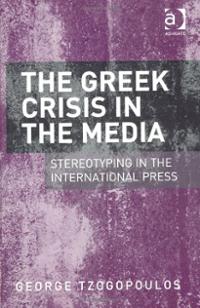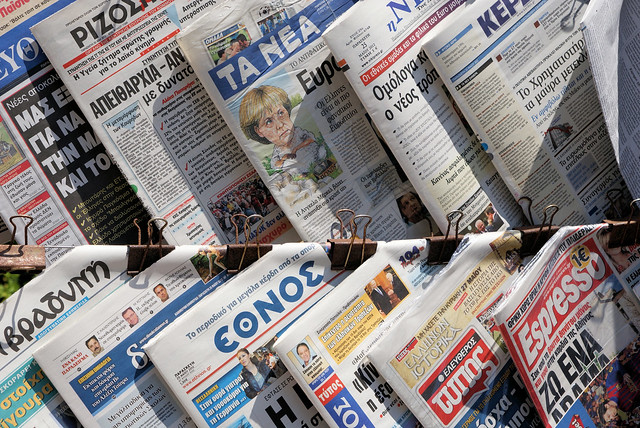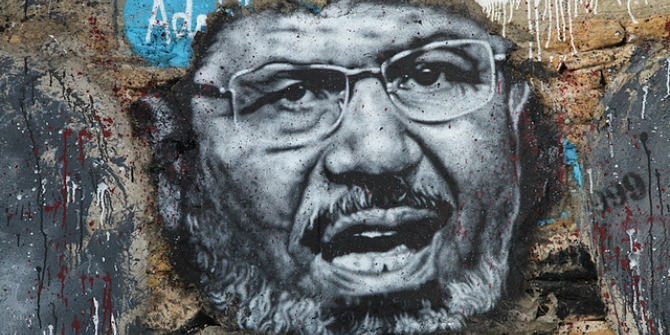 Throughout the course of the economic and financial crisis in Europe, Greece has been the epicentre of international media coverage. Based on a study of newspapers in five countries, George Tzogopoulos assesses the coverage of Greece in the international press, providing insight on the way in which news media helps to shape the views of citizens. Maria Kyriakidou finds that some of the conclusions are problematic, but overall this is a good introduction to the topic.
Throughout the course of the economic and financial crisis in Europe, Greece has been the epicentre of international media coverage. Based on a study of newspapers in five countries, George Tzogopoulos assesses the coverage of Greece in the international press, providing insight on the way in which news media helps to shape the views of citizens. Maria Kyriakidou finds that some of the conclusions are problematic, but overall this is a good introduction to the topic.
 The Greek Crisis in the Media: Stereotyping in the International Press. George Tzogopoulos. Ashgate. May 2013.
The Greek Crisis in the Media: Stereotyping in the International Press. George Tzogopoulos. Ashgate. May 2013.
The role of the media in communicating and informing the public about the Eurozone crisis has often been questioned. Instead of promoting a European public sphere of mutual understanding, the media have been accused of resorting to stereotypes and contributing to a blame game among European publics. In his book The Greek Crisis in the Media: Stereotyping in the International Press, George Tzogopoulos addresses these issues by exploring how Greece and its economy were portrayed in the first couple of years of the crisis. Taking as a starting point the prevalent assumption that the foreign press has been in general biased against Greece, Tzogopoulos explores the international press coverage of the Greek crisis, focusing in particular on the (re)production of stereotypes and the reflection of national interests in dominant media discourses.
Contrary to what the title of his book might suggest, Tzogopoulos ultimately argues that not only does the foreign press not stereotype Greece, but it contributes to the internationalisation of the crisis and the illustration of the social and humanitarian dimensions of the crisis often ignored by Brussels (p. 155). Paraphrasing the concept of the “CNN effect”, which was employed to describe the impact of CNN on US foreign policy, Tzogopoulos uses the term the “Greek effect”, to express the belief in the possibility that the press can direct attention to the social aspects of the crisis, such as poverty and unemployment.
This is an interesting argument which challenges pre-existing assumptions about international press coverage as a contributing factor to national stereotyping and the creation of divisive lines within Europe. At the same time, however, it sounds more like wishful thinking rather than an empirical finding. The author himself hints at this, when he says that “the ‘Greek effect’ might possibly drive the attention of world policymakers towards the tangible aspects of the problem” (p. 162), while at the same time acknowledging the “usage of populist rhetoric and production of stereotypes” in media discourse (p. 155), as well as journalists’ tendency to overgeneralise (p. 162).
Tzogopoulos bases his argument on the analysis of an impressive corpus of material covering the period starting in the last quarter of 2009, when the Greek crisis was first introduced in the international press, until the first months of 2012. Tzogopoulos includes thirteen newspapers from five different countries in his sample, covering Britain, France, Germany, Italy and the USA, which he analyses with both quantitative and qualitative techniques. He complements this extensive sample with in-depth interviews conducted with journalists, bankers and policy-makers familiar with the Greek crisis.
The first chapters of the book focus on the political and economic background against which the sovereign debt crisis developed in Greece. As a former journalist and current research fellow for the Hellenic Foundation for European and Foreign Policy, Tzogopoulos paints a grim picture of a country troubled by clientelism, populism, overspending and corruption (Chapter 2). These peculiarities of the Greek cultural context, which is a recurrent theme in the book, serve to understand the difficulties the country has faced in the first years of the crisis (Chapter 3). Tzogopoulos argues that despite the two bailouts given to Greece, there seems to be no end to the Greek drama, largely due to Greek incompetence, illustrated mostly as the combination of domestic political instability and a political credibility deficit (p. 47). This detailed account of the political background of the crisis, albeit often descriptive, might be especially interesting for non-Greek readers, as it gives an insider’s perspective into Greek political culture.

The first empirical chapter (Chapter 4) presents the results of the quantitative analysis, which interestingly indicates that, in terms of volume of articles, Greece generally attracted greater relative attention in the foreign press. In particular, the press showed more attention to Greece in comparison to Ireland or Portugal, the two countries that also asked for the activation of the bailout mechanism, with the exception of the British press, which extensively covered the Irish case (p. 70). Greece also attracted more coverage than Italy and Spain in the international economic press over the period 2010-2011, again with the exception of the Financial Times and its focus on Ireland (p. 72). The German press hosted comparatively more articles on Greece, which can be attributed to the leading role Germany has played in the Euro crisis (p. 66).
These are important quantitative findings, which Tzogopoulos further attempts to elaborate on by qualitatively exploring the main themes and frames the press employed when covering the Greek crisis (Chapters 5 and 6). It is here that the book falls short of its potential as the discussion does not do justice to the rich material the author has gathered. The analysis identifies a number of important themes in the way the foreign press treated the Greek crisis, such as the focus on corruption, nepotism, tax evasion and bureaucracy, as problems inherent in Greek politics, as well as stories focusing on the human aspect, reporting the pain of austerity as experienced by the Greek people. This illustrates the complexity of the foreign press coverage when it comes to the Greek crisis. However, the discussion in the empirical chapters does not capture that the most prominent finding of the research is the internationalisation of the Greek crisis by the foreign press rather than its stereotypical representation.
The first problem here lies with the analysis of the material itself. Lacking in systematisation, the analysis is weak and reads as a descriptive account, often mixing the coverage of stories with a narrative of the events covered. It illustrates the plurality of the different topics the foreign press covered but fails to indicate what the dominant frames of reporting the crisis were. The power of discourse to create stereotypes lies not only in the choice of themes covered but also the ways these are discussed. In this respect, even stories focusing on the human aspect and the suffering caused by austerity policies might contribute to stereotyping. Additionally, the fact that most of the coverage focused on the peculiarities of the Greek context, perhaps following already established, pre-crisis discourses on Greece, and did not explore structural problems of the Eurozone as contributing factors to the crisis, is in itself an important dimension not adequately highlighted in the book.
Furthermore, drawing conclusions about the “international press” as if it were a mostly homogeneous entity is problematic. In general, the author does not fall into this fallacy, as he acknowledges the significance of national interests in the coverage of the crisis (p. 104) and points out the fact that American, British and German newspapers have been more hostile to Greek society than the Italian and French press (p. 129). However, the conclusions of the book balance out these differences, arguing that “foreign journalists have, as a whole, reported developments in the Hellenic Republic in a clear, comprehensive and fair way” (p. 155).
Given the different role the countries discussed have played in the euro crisis, however, and the centrality of the press in the formation of the opinion of their national publics, it is crucial to distinguish between the different national contexts and their journalistic treatment of the Greek crisis. In other words, the hostile treatment of Greece in the German press might have more significant political implications than a similar treatment by the British or American press. Focusing more on the national differences in the coverage of the crisis would have allowed Tzogopoulos to more critically engage with the role of the media in the euro crisis overall.
These limitations do not, however, undermine the significant contribution of the book to the ongoing debates on the European crisis and the role that the media are to play in its coverage. Greece, as Tzogopoulos argues, has been an ideal case for international journalists to study corruption, clientelism and other social and political pathologies. The coverage of its crisis, in the same way as the coverage of the Eurozone crisis overall, is a dynamic process, influenced by cultural, political and organisational factors. As the euro crisis develops, it seems certain that a lot of academic work will similarly engage with how its various aspects are communicated to the public and the role of the media in the promotion or fragmentation of the European idea. In this line of work to follow, this book is definitely a good start.
————————————————-
Maria Kyriakidou is a Lecturer in Cultural Politics, Communications and Media at the University of East Anglia. She holds a PhD in Media and Communications from the London School of Economics. Her work focuses on the relationship between media and globalisation, the mediation of distant suffering, cosmopolitanism and discourse theory. Read more reviews by Maria.







1 Comments